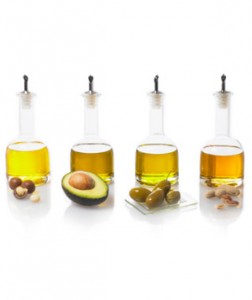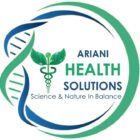Essential Fatty Acids
Extract Summary from Dr Arien van der Merwe’s book Health & Happiness
Poly- and mono-unsaturated fatty acids form part of the fats (lipids) that serve as a source of energy in the body. Fat is t he form in which the body stores its energy. Lipids also form part of the phospholipid structure of all cell membranes.
he form in which the body stores its energy. Lipids also form part of the phospholipid structure of all cell membranes.
Two essential fatty acids that are not made in the body and have to be taken in with food are alpha linolenic acid (ALA), an omega-3 fatty acid, and linoleic acid, an omega-6 fatty acid.
Specific enzymes in the body convert the ALA into eicosapentanoic acid (EPA) and docosahexanoic acid (DHA). This conversion is slow and restricted in the human body. Too many omega-6 fatty acids in the diet can also slow down this conversion.
Linoleic acid can be stored in the body, oxidised to provide energy, or converted into other substances such as gamma linolenic acid (GLA) and arachidonic acid, which have important physiological functions in the body.
In the human body, the omega-3 and omega-6 fatty acids follow two different metabolic pathways which are controlled by the same enzymes. The important tempo regulating enzyme in this process is delta-6 desaturase.
Examples of plants that are rich in ALA are the green leafy vegetables, linseed (flax), canola and soya beans. Most omega-3 fatty acids, however, are produced by the phytoplankton (microscopically small plants) in water. They are passed into the food chain by shrimps, and other bottom feeding crustaceans, to the higher order animals such as shellfish, seals, whales, trout, salmon, tuna, mackerel, sardines and galjoen (damba). Humans take in omega-3 when they consume any of these coldwater fatty fish (seawater and freshwater fish).
Omega-3 and omega-6 fatty acids
Omega-6 is found in abundance in plants. Olive, wheatgerm, cotton seed, grapeseed, safflower and soya bean oils are rich in linoleic acid. The main sources of GLA are evening primrose oil, starflower oil, borage and blackberry seeds.
The diet of earlier generations was rich in omega-3 and omega-6 fatty acids. The typical Western diet contains mainly omega-6 fatty acids in the form of linoleic acid, with very small quantities of omega-3 fatty acids. This imbalance places a physiological burden on the human body, which we haven’t yet had sufficient time to adapt to and prepare for, through genetic adaptation. It is therefore important to supplement the human diet with GLA, a further step in the omega-6 conversion, as well as EPA and DHA (omega-3 fatty acids) in the form of fish oil such as found in salmon. To take in a sufficient quantity in the diet alone, you would need to eat about 1 kg of oily fish a week.
Children and teenagers, people who are stressed (all of us!), pregnant women and those affected by depression, allergies, attention deficit disorder (hyperactivity), poor concentration or poor memory, usually have marginal deficiencies of these essential fatty acids.
This lack is also common after injury, during infection and in people who have digestive tract problems. The needs of the foetus and the newborn baby for essential fatty acids are particularly great.
Many people have an inherited sluggishness of delta-6 desaturase, or a weakened function of this enzyme. They are therefore not able to further metabolise the ALA and linoleic acid in sufficient quantities. This is particularly noticeable in children who suffer from hyperactivity, allergies and eczema and those who suffer from diabetes, depression, poor concentration and poor memory. Prolonged and chronic stress also places great demands on the enzyme, and as a person gets older, the enzyme becomes less active. By taking supplements of GLA, EPA and DHA, you bypass the enzyme problem and provide the next steps in the metabolic pathways of the omega-3 and omega-6 fatty acids.
The quantities of omega-3 and omega-6 that you take, are also important. In humans the two pathways are separate, but they compete for the same enzymes. If you take in too much omega-6 on its own, too little EPA and DHA will be formed. This has many health implications.
Besides being an essential part of the phospholipid structure of cell membranes, the omega-6 fatty acids are also precursors of prostaglandins. GLA is quickly converted to dihomogammalinolenic acid (DGLA) and then prostaglandins.
Prostaglandins suppress platelet aggregation thereby preventing blood clotting, an important function in the prevention and treatment of heart attacks and stroke. GLA and DGLA also suppress the inflammatory process, for example after injury, in contact dermatitis, arthritis and other joint infections. GLA and DGLA are also used to reduce blood pressure in hypertension, to decrease LDL-cholesterol and increase HDL-cholesterol. The omega-3 fatty acids form part of the phospholipid structure of cell membranes. This function of the omega-3 and omega-6 fatty acids is an important part of transfer of fluid through cell membranes, electrolyte balance, hormone function and the immune function. Some of the omega-3 fatty acids, especially EPA, are also precursors of prostaglandins. EPA and DHA play a role in the prevention and treatment of cardiovascular disease such as hypertension, high LDL-cholesterol, stroke and heart attacks.
Functions of prostaglandins, omega-3 and omega-6 fatty acids
Prostaglandins are hormone-like compounds with many functions, found in all cells of the body. Biologically they are very active and form part of most biochemical activities that occur in all the organs of the body. Prostaglandins are also involved in the immune system where one of their functions is to suppress and prevent allergic reactions. This important group is also closely associated in the process of nerve transmission in the memory and concentration centres of the brain.
In addition to some of the omega-3 and omega-6 fatty acids being converted to prostaglandins, they have functions of their own. Deficiencies of essential fatty acids (EFA) are common and usually quite subtle and imperceptible.
The functions of essential fatty acids include the following:
- Essential fatty acids maintain the fluidity of all cell membranes – to ensure that fluids, nutrients and oxygen can move into, and waste products out of cells.
- Essential fatty acids help the red blood cells in transporting oxygen to cells.
- Essential fatty acids prevent blood platelets from sticking together. This prevents the blood in the blood vessels from clotting, as happens in atherosclerosis, after heart attacks and stroke, thrombosis and pulmonary embolism.
Essential fatty acids are crucial in the prevention and treatment of all diseases of the heart and blood vessels.
- Ensure optimal and efficient kidney function.
- All the essential fatty acids are a good reserve energy source for the whole body and the main source of energy for heart function.
- Prostaglandins and essential fatty acids form an important part of the nervous system\’s neurotransmitters or informational substances. They improve the release of neurotransmitters, particularly in the memory and concentration centres of the brain. Prostaglandins act as neurotransmitters themselves. Many people have insufficient quantities and/or a poor quality of the enzyme delta-6 desaturase, with the result that too little omega-6 and especially omega-3 fatty acids are produced. One of the effects is attention deficit disorder, poor concentration and all forms of hyperactivity. Poor message transfer is also a problem in depression, tension or distress, Alzheimer\’s disease and other disorders of the nervous system such as multiple sclerosis, tinnitus (ringing in the ears) and in migraines
Essential fatty acids can also play a role in the treatment of schizophrenia. The omega-3 fatty acid docosahexanoic acid (DHA) is very important for the normal functioning of the nervous system. It is plentiful in the synapses, the points where the dendrites and neurons meet and where messages are passed from one nerve to the other by means of the neurotransmitters. DHA is essential for normal vision, as it is abundant in the retina of the eye. It is also important for normal brain and cognitive development in children and the developing embryo and foetus. (Consult Chapter 12 on the nervous system for information on the other micronutrients that play a role in the normal functioning of nerve transfer and the maintenance of the nervous system).
The symptoms of children and adults who experience allergies, poor concentration, poor memory and hyperactivity, improve after taking supplements of omega-3 and omega-6 fatty acids. The problem is often a deficiency of the enzyme delta-6 desaturase. The production of prostaglandins in such cases is insufficient for the body\’s needs, and a marginal deficiency of prostaglandins will arise in due course. By bypassing the enzyme deficiency and supplementing with the essential fatty acids, you can provide the next steps in the manufacturing process of prostaglandins. (Look at the diagram on the metabolic pathways of the omega-3 and omega-6 fatty acids).
- Essential fatty acids and prostaglandins reduce high blood pressure by improving the smooth muscle tone in the arteries.
- Decrease bad LDL-cholesterol and increase good HDL-cholesterol levels.
- Gamma linolenic acid and the omega-3 fatty acids suppress the growth of cancer cells. Tumour cells lack delta-6 desaturase, which means a lack of GLA and omega-3 fatty acids. Essential fatty acids are therefore important in the prevention and treatment of all forms of cancer.
- Boost the immune system and play an important role in the prevention and treatment of acute and chronic infections, as well as autoimmune diseases such as rheumatoid arthritis, lupus, multiple sclerosis, ulcerative colitis and Crohn\’s disease. They are also important in all instances of allergy because they reduce the immune system\’s hypersensitivity to allergens (substances that induce an allergic reaction in sensitive people). Research has shown that people who suffer from atopic (allergic) eczema have a deficiency of the enzyme delta-6 desaturase and as a result produce too little dihomogammalinolenic acid and arachidonic acid.
This leads to a deficiency of the prostaglandins which are specifically involved in the prevention of allergic reactions. GLA supplements (such as evening primrose and starflower oil) compensate for this deficiency and help in the prevention and treatment of atopic eczema and other allergies.
- Vital for the skin, nails and hair. Anyone who experiences a skin disease such as acne, eczema, dermatitis, psoriasis or sun damage, must take supplements of omega-3 and omega-6 fatty acids.
- Important for all inflammatory conditions such as all forms of arthritis, muscular injury or myositis and joint pain (arthralgia). The fatty acids helps in the maintenance of the function of the muscles and skeleton. They help prevent osteoporosis. All people who participate in any sport should take supplements of essential fatty acids to improve exercise tolerance, endurance, stamina and performance.
- Used in the treatment of diabetes. Prostaglandins regulate the secretion of insulin by the pancreas, a major problem in diabetes. Research has shown that supplements of essential fatty acids improve the neuropathy often associated with diabetes.
- Help in the prevention of the severe loss of body weight (cachexia) associated with cancer, Aids and other debilitating chronic infections such as tuberculosis.
- Help overweight people to release weight by increasing cell metabolism and allowing the electrolyte and water balance to function in optimal conditions.
- Often prescribed for the relief of symptoms associated with premenstrual tension, menopause and other complaints connected with the female urogenital system. They improve fibrocystic breast disease and premenstrual fluid retention.
- Protect the liver from the toxic effects of alcohol and other poisons.
Essential fatty acids will not necessarily cure all ailments. However, they certainly reduce symptoms and prevent further complications. They restore tissue function at an almost imperceptible, and very subtle level. It is not surprising that essential fatty acids are recommended as a vital part of every person\’s daily food supplement, or nutriceutical (nutri=food based and –ceutical = medicine) routine.
